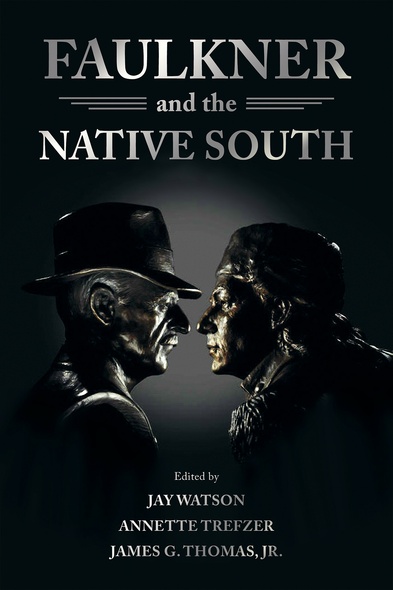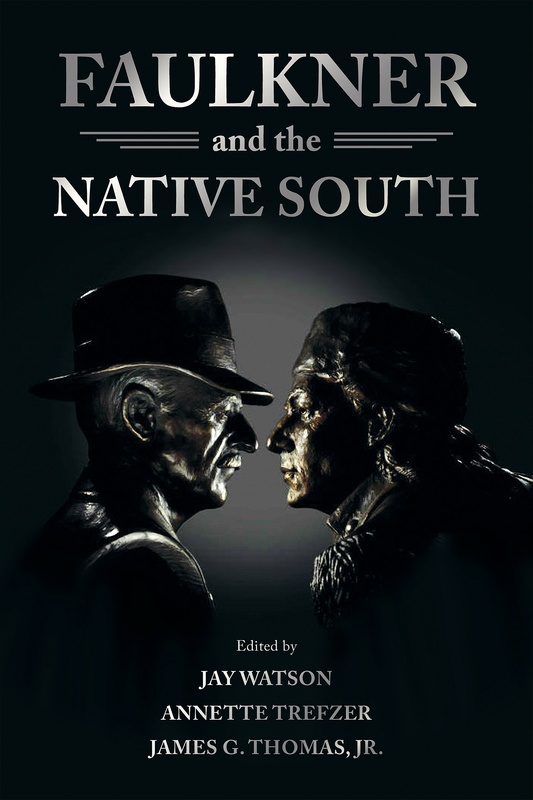Our shopping cart is currently down. To place an order, please contact our distributor, UTP Distribution, directly at utpbooks@utpress.utoronto.ca.

Faulkner and the Native South
Contributions by Eric Gary Anderson, Melanie R. Anderson, Jodi A. Byrd, Gina Caison, Robbie Ethridge, Patricia Galloway, LeAnne Howe, John Wharton Lowe, Katherine M. B. Osburn, Melanie Benson Taylor, Annette Trefzer, and Jay Watson
From new insights into the Chickasaw sources and far-reaching implications of Faulkner’s fictional place-name “Yoknapatawpha,” to discussions that reveal the potential for indigenous land-, family-, and story-based methodologies to deepen understanding of Faulkner’s fiction (including but not limited to the novels and stories he devoted explicitly to Native American topics), the eleven essays of this volume advance the critical analysis of Faulkner’s Native South and the Native South’s Faulkner. Critics push beyond assessments of the historical accuracy of his Native representations and the colonial hybridity of his Indian characters. Essayists turn instead to indigenous intellectual culture for new models, problems, and questions to bring to Faulkner studies. Along the way, readers are treated to illuminating comparisons between Faulkner’s writings and the work of a number of Native American authors, filmmakers, tribal leaders, and historical figures.
Faulkner and the Native South brings together Native and non-Native scholars in a stimulating and often surprising critical dialogue about the indigenous wellsprings of Faulkner’s creative energies and about Faulkner’s own complicated presence in Native American literary history.
Stemming from the 2016 Faulkner and Yoknapatawpha conference of the same title, Faulkner and the Native South makes a cogent, illuminating, and timely contribution to the distinct but overlapping fields of southern studies and Native studies. Published in a moment of rising nativism, the collection gives readers a valuable opportunity to reflect on the history of those who are truly indigenous to the region about which William Faulkner wrote.
The array of sharply debated themes in Faulkner and the Native South reveals the value of Faulkner studies as a vital path of inquiry.
Jay Watson (Editor)
Jay Watson is Howry Professor of Faulkner Studies and Distinguished Professor of English at the University of Mississippi. He is author of many publications, including William Faulkner and the Faces of Modernity; Forensic Fictions: The Lawyer Figure in Faulkner; and Fossil-Fuel Faulkner: Energy, Modernity, and the US South. He is also coeditor of multiple volumes in University Press of Mississippi’s Faulkner and Yoknapatawpha Series.
Annette Trefzer (Editor)
Annette Trefzer is professor of English at the University of Mississippi. She is author of Exposing Mississippi: Eudora Welty’s Photographic Reflections and Disturbing Indians: The Archaeology of Southern Fiction and coeditor of Global Faulkner; Faulkner’s Sexualities; Faulkner and Mystery; Faulkner and Formalism: Returns of the Text; and Faulkner and the Native South, all published by University Press of Mississippi, and her work has appeared in many journals.
James G. Thomas Jr. (Editor)
James G. Thomas, Jr., is associate director for publications at the University of Mississippi’s Center for the Study of Southern Culture. He is an editor of the twenty-four-volume New Encyclopedia of Southern Culture and The Mississippi Encyclopedia;coeditor (with Jay Watson) of Faulkner and Print Culture, Faulkner and History, and Faulkner and the Black Literatures of the Americas; and editor of Conversations with Barry Hannah. His work has appeared in Ethnic Heritage in Mississippi: The Twentieth Century, Southern Cultures, Southern Quarterly,and Living Blues.





